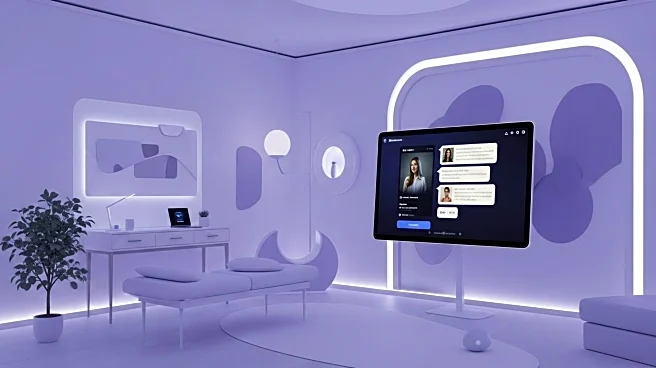What is the story about?
What's Happening?
With a shortage of licensed therapists in the U.S., many individuals are turning to AI chatbots like ChatGPT for mental health support. These chatbots, marketed as 'mental health companions,' offer a form of support that is accessible and affordable, especially for those priced out of traditional therapy. Users like Kristen Johansson have found solace in these AI tools, which provide immediate responses and a sense of companionship. However, experts like Dr. Jodi Halpern caution that while AI can assist with structured treatments like cognitive behavioral therapy, it lacks the ethical oversight necessary for deeper emotional support. Concerns have been raised about the potential for AI to create false intimacy and the lack of regulation in handling sensitive mental health issues.
Why It's Important?
The reliance on AI for mental health support highlights significant gaps in the U.S. healthcare system, particularly the accessibility and affordability of mental health services. As AI tools become more integrated into personal care, they offer a stopgap solution for those unable to access traditional therapy. However, the ethical implications and potential risks associated with AI-driven mental health support necessitate careful consideration and regulation. The situation underscores the need for a balanced approach that combines technological innovation with human oversight to ensure safe and effective mental health care.
What's Next?
As AI continues to play a role in mental health support, there is a pressing need for regulatory frameworks to ensure ethical use and safety. Companies like OpenAI are beginning to implement guardrails, particularly for younger users, but more comprehensive measures are required. The mental health community may need to adapt by integrating AI tools into traditional therapy practices, ensuring that human therapists are aware of and can guide the use of these technologies. Ongoing dialogue between tech developers, healthcare professionals, and policymakers will be crucial in shaping the future of AI in mental health care.
Beyond the Headlines
The integration of AI in mental health care raises questions about the future of therapeutic relationships and the role of technology in personal well-being. As AI tools become more sophisticated, they may challenge traditional notions of empathy and human connection in therapy. This development could lead to a reevaluation of what constitutes effective mental health support and how technology can complement, rather than replace, human interaction.
















